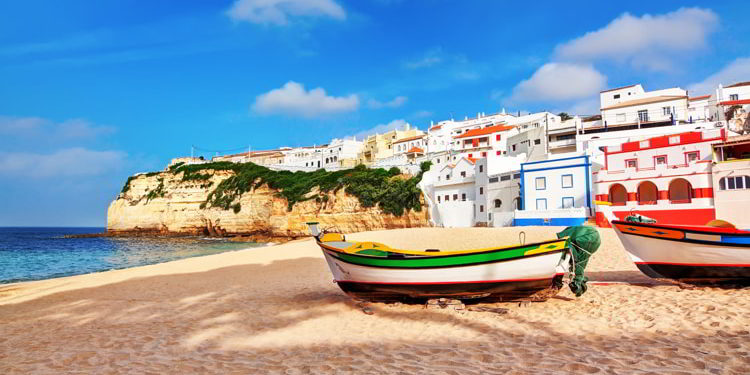Portugal’s Algarve is a wonderful bit of European geography at the southwestern corner of the Continent, at the longitude of Great Britain, more or less, and the latitude of Delaware, protected from winter by the movement of the ocean in the Gulf Stream, which brings warm water to the Algarve’s coast.
As a result, the Algarve has the best climate in Europe, meaning the most days of sun, and it also gains from prevailing winds. Between the water and the wind, this region is never unbearably hot and rarely humid.
Unlike many sunny paradises, the Algarve is not a little island in the middle of no place in the sea. It is attached to the Old Continent and reachable by car from Lisbon and points farther north. You can also fly from the U.S. East Coast in short hops, as few as six hours to Lisbon from Boston, for example, where many flights originate thanks to the Portuguese diaspora. From there, a three-hour drive takes you to the south coast resorts.
Britons and Irish often sail to Portugal in ferries with their cars in the hold, then drive down to Portuguese seaports. You can spot them because they are driving on the wrong side of the road and look confused. This despite their long presence in this part of the world.
In fact, one reason the Algarve is a delightful choice for American retirees is thanks to the British.
The monarchs of Portugal and England married each other from the 14th century or so, creating the oldest alliance in Europe before Europe really existed.
The famous animator of Portugal’s age of exploration, Prince Henry the Navigator, after whom the trans-Algarve motorway is named, was half-British. It is thanks to Prince Henry that the Portuguese explorers were under orders to “sail on, sail on.” That got them around the Cape of Good Hope to China and India and then across the Atlantic.
The Anglo-Portuguese friendship did not end with the death of Prince Henry and his brothers. British royals continued to marry Portuguese princesses, sometimes causing religious problems.
During World War II, despite Portuguese neutrality, the British first won the right to move evacuees from Gibraltar to Madeira and then to build a base in the Azores. While Salazar was ideologically close to Hitler and Franco, he was flattered by British attentions to Portugal’s importance, and his own. So, thanks to Salazar, the U.S. forces were able to hop via the Azores to North Africa, Britain, and later Continental Europe in easier stages than flying the whole distance in one go.
After World War II, the Anglo-American allies continued to operate from the Azores. Over time, thanks to the wine and port trade, lots of posh British families settled in Portugal. By the 1950s, they had begun to colonize the south coast along the Algarve, bringing with them the key element of sporting life—golf courses.
A decade or so later, the charms of the Algarve were discovered by The Beatles and their groupies, who moved in to the Algarve fishing port of Albufeira, still the home of the most authentic fish and chips on the south coast.
Despite all this attention from British tourists and expats, the Algarve was never as overbuilt as the Costa Brava in Spain, mainly because the terrain is simply too hilly to allow mass-produced ticky-tacky little boxes to be plunked down (as they have been, over the decades, along stretches of Spain’s coast). Portugal is a small country; however, if you could flatten out its hills and valleys, it would cover about three times the area it fills today.
The most important relic of all those years of buddying up with the Brits is a key to American and Canadian happiness in the Algarve today.
The natives all started learning English almost as soon as they got schools. There are plenty of non-British foreigners in the Algarve, too, from Germany, Eastern Europe, Scandinavia, and even the Far East, but they all also speak English.
In fact, the lingua franca for selling anything in the Algarve, be it a multimillion-dollar condo, a pair of sneakers, or a Diet Coke, is our Mother Tongue.
What a relief.
Until next time,

Kathleen Peddicord
Founding Publisher, Live And Invest Overseas











